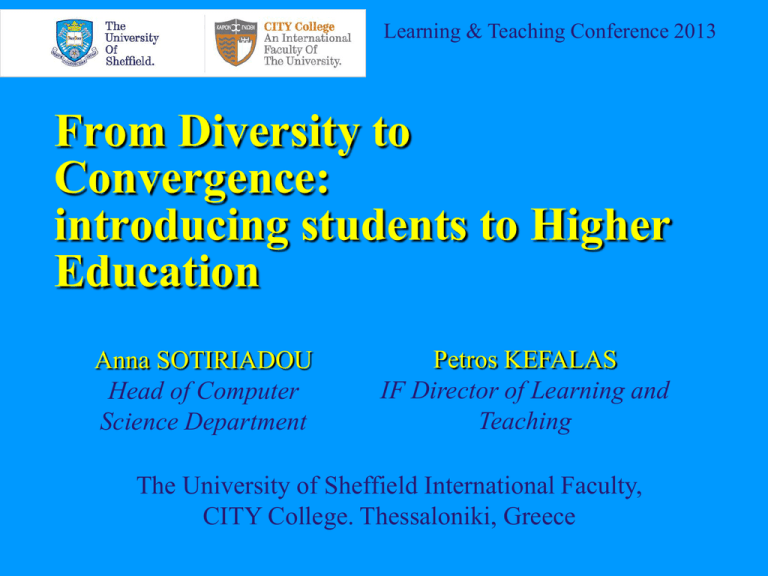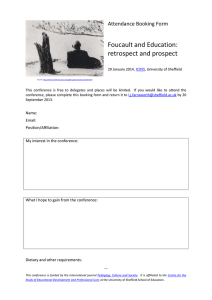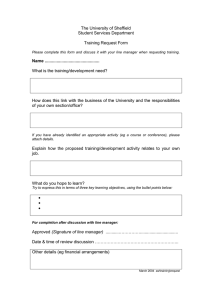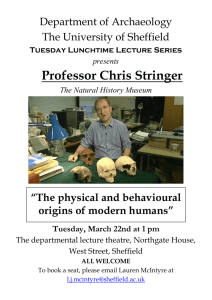From Diversity to Convergence: introducing students to Higher Education
advertisement

Learning & Teaching Conference 2013 From Diversity to Convergence: introducing students to Higher Education Anna SOTIRIADOU Head of Computer Science Department Petros KEFALAS IF Director of Learning and Teaching The University of Sheffield International Faculty, CITY College. Thessaloniki, Greece The International Faculty Student Body Thesasaloniki: Masters: 6, Bachelor: 3 Abroad: Masters 11, Bachelor:1 Student Body Thessaloniki 543 60% Abroad 359 40% Total 902 Undergraduates 370 41% Postgraduates 532 59% Greek 272 30% Non-Greek 630 60% Greek 271 50% Non-Greek 272 50% In Thessaloniki Diversity on Entrance The setup • At the IF: • an environment with 100% International students • originated mainly from SEE. • At Sheffield: • 79% is Home and EU (including non UK) • 21% is non Home/EU High School in SEE The situation/characteristics of High Schools in SEE: • unbalanced knowledge - skills • unbalanced teaching - independent learning • heavily based on exams • exam questions are mainly memorisation • problem solving based on patterns • lack of feedback and personal development • rare contact with teachers outside the classroom Diversity • It is expected that candidates from different countries enter UK HE possessing skills that range from none to a wide variety. • Awareness of what is expected in HE is also variant. • The inter-cultural perspective adds another dimension of complexity. The main problem: How to enhance the skills of new students (either UG or PG) so that we can facilitate their smooth transition to HE needs? How to enhance the skills of new students (either UG or PG) so that we can facilitate their smooth transition to HE needs? Workshop & Discussion Best Practices You said … The approach at the International Faculty Alternatives • Tutorial system for UG • A series of workshops for PG • Academic and transferable skills unit • Badging of units to monitor that the Sheffield Graduate attributes are given Runs over 2 semesters Recorded on Transcript 2 hours round table discussions every fortnight Non-credit Level 1 Tutorial System No assessment, portfolio based Students are split into groups of 5-6 Tutor assigned also provides pastoral support Run once a fortnight Targeted mainly on new PG students who graduated a state University in SEE Workshops for PG More tutorials provided with screencasts (myEcho) More intensive, needs to focus: • on research skills • information literacy • report writing • assessment • utilising feedback In some cases it is delivered in parallel with: • Computing Skills and • Academic English Skills Academic and Transferable skills One semester Credit unit Aims to assist students to develop academic and transferable skills that can be used in all other units of the curriculum and during all the years of study. Also aims to introduce students to the specific academic environment and its regulations. Skills • Time Management: Academic calendar, Coursework map, Developing Study plans. “Chance Nota” case study • Reading Skills: The use of textbook, lecture notes and personal notes. Reading techniques. The role of the environment. Group Study. Reading Skills self-test. • Learning styles: Ways of learning. • Class attendance: Active engagement Skills • Note taking: Organisation of personal notes. • Information Literacy: Searching for sources, How to refine search, Use of library and e-libraries, Types of publications, The Internet as a source, Copyright issues. • Evaluation of sources: What is reliable, credible and trustworthy and what is not? • Plagiarism and Collusion: Impersonation. Definitions. Examples. How to avoid it. The role of TurnItIn. • Referencing: Why and what to reference? Referencing Styles. Citations. Bibliography. Skills • Writing a report: Planning. Structure. Content. Argumentation. Justification. Opinion. Writing techniques. Report format and language issues. Checklist for a successful submission. • Assessment & Marking: Marking Scheme. Criteria for assessment and marking. • Feedback: Principles of feedback. The role of feedback. Feedback on exams. Quality Assurance and fairness of marking. • Working in groups: Collaboration. Creating Teams. Roles and Responsibilities. Group and individual assessment and feedback. Skills • Research Skills: What is research? Research Ethics. Research Methods. Working with data. • Presentation of work: Audience, Tips and guidance for a good oral presentation. • Revision for exams: Exam Writing techniques. Time management in preparing and taking exams. • Self-Assessment and goal setting. Semester evaluation Inclusion to HE • Our Commitment: What is expected in HE from students and staff?. • The Sheffield Graduate: profile and award. Introduction to the academic environment. • Virtual Learning Environment: Lecture Notes. Organisation of e-documents. • Coursework Assignments: Submission Deadline and penalties. Submission process. Inclusion to HE • Services: What do I do when I need ...? • Rules and Regulations: Curriculum. Units. Credits. Sits and Resits. Combination of Marks. Degree and Classification of degree. Attendance. Progression. Disciplinary issues. Appeals. • Who is who: in Dept, Faculty, University? Unit Badging Each module syllabus contains badges mapped to Sheffield Graduate attributes: Conclusions Conclusions There are two options: 1. either leave the students acquire skills gradually through their studies or 2. do something for those who need to catch up at the beginning of their studies We, at IF, choose the latter. The International Faculty: Creativity, Innovation & Competitiveness Thank you for your participation!! Ideas shared, presentation and other related documents will be available to all participants after the conference.




